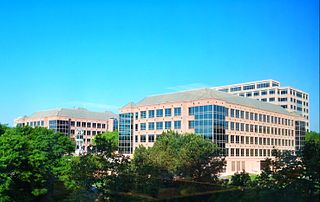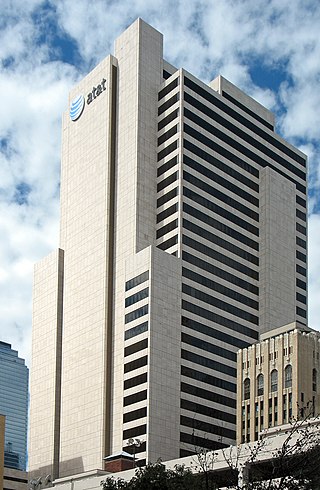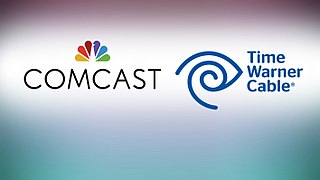
T-Mobile is the brand name used by some of the mobile communications subsidiaries of the German telecommunications company Deutsche Telekom AG in the Czech Republic, Poland and the United States.

Comcast Corporation, incorporated and headquartered in Philadelphia, is an American multinational telecommunications and media conglomerate. The corporation is the second-largest broadcasting and cable television company in the world by revenue. It is the third-largest pay-TV company, the second-largest cable TV company by subscribers, and the largest home Internet service provider in the United States. In 2023, the company was ranked 51st in the Forbes Global 2000. Comcast is additionally the nation's third-largest home telephone service provider. It provides services to U.S. residential and commercial customers in 40 states and the District of Columbia. As the owner of the international media company NBCUniversal since 2011, Comcast is also a high-volume producer of feature films for theatrical exhibition and television programming, and a theme park operator. It is the world's third-largest telecommunications company by revenue.

AT&T Mobility, LLC, also known as AT&T Wireless and marketed as simply AT&T, is an American telecommunications company. It is a wholly owned subsidiary of AT&T Inc. and provides wireless services in the United States. AT&T Mobility is the largest wireless carrier in the United States, with 241.5 million subscribers as of December 31, 2023.
Verizon is an American wireless network operator that previously operated as a separate division of Verizon Communications under the name Verizon Wireless. In a 2019 reorganization, Verizon moved the wireless products and services into the divisions Verizon Consumer and Verizon Business, and stopped using the Verizon Wireless name. Verizon is the second-largest wireless carrier in the United States, with 144.8 million subscribers as of December 31, 2023. It currently has the largest network in the United States with their LTE network covering 70% of the United States.
Western Wireless Corporation was a cellular network operator that provided mobile telecommunications service to subscribers in 19 western states in the United States, and seven other countries. Western Wireless marketed analog cellular service under the CELLULAR ONE brand in 88 FCC-defined rural service areas and digital PCS service under the VoiceStream brand in 19 FCC-defined metropolitan service areas. At its peak in 2004, Western Wireless provided service to 1.4 million domestic subscribers. Western Wireless obtained additional revenue from the international operations of its Western Wireless International Corporation subsidiary, which was licensed to provide wireless communications services in seven countries to a total of 1.8 million subscribers.
TracFone Wireless, Inc. (TFWI) is an American prepaid, no-contract mobile phone provider. TFWI is a subsidiary of Verizon Communications, and offers products and services under several brands. It operates as a mobile virtual network operator (MVNO), holding agreements with the three largest United States wireless network operators to provide service: AT&T Mobility, T-Mobile US, and Verizon.

Sprint Corporation was an American telecommunications company. Before being acquired by T-Mobile US on April 1, 2020, it was the fourth-largest mobile network operator in the United States, serving 54.3 million customers as of June 30, 2019. The company also offered wireless voice, messaging, and broadband services through its various subsidiaries under the Boost Mobile and Open Mobile brands and wholesale access to its wireless networks to mobile virtual network operators.

Cricket Wireless is an American wireless service provider, owned by AT&T. It provides wireless services to ten million subscribers in the United States. Cricket Wireless was founded in March 1999 by Leap Wireless International. AT&T acquired Leap Wireless International in March 2014, and later merged Cricket Wireless operations with Aio Wireless. Cricket Wireless competes primarily against T-Mobile's Metro by T-Mobile, Dish's Boost Mobile and Verizon's Visible in the prepaid wireless segment.

AT&T Communications is a division of AT&T that focuses on mobile phone, broadband, fixed line telephone, home security, network security, and business services. The division houses AT&T Mobility, AT&T Internet, AT&T Phone, AT&T Long Distance, AT&T Labs, AT&T Digital Life, and AT&T Cybersecurity.
T-Mobile UK was a mobile network operator in the UK. First launched as Mercury One2One on 7 September 1993, the network was originally operated by Mercury Communications. one2one was purchased by Deutsche Telekom in 1999, who rebranded it with their global T-Mobile brand name in 2002.
The United States 700 MHz FCC wireless spectrum auction, officially known as Auction 73, was started by the Federal Communications Commission (FCC) on January 24, 2008 for the rights to operate the 700 MHz radio frequency band in the United States. The details of process were the subject of debate among several telecommunications companies, including Verizon Wireless, AT&T Mobility, as well as the Internet company Google. Much of the debate swirled around the open access requirements set down by the Second Report and Order released by the FCC determining the process and rules for the auction. All bidding was required by law to commence by January 28.

AT&T Inc. is an American multinational telecommunications holding company headquartered at Whitacre Tower in Downtown Dallas, Texas. It is the world's fourth-largest telecommunications company by revenue and the largest wireless carrier in the United States. As of 2023, AT&T was ranked 13th on the Fortune 500 rankings of the largest United States corporations, with revenues of $120.7 billion.

Verizon Communications Inc., commonly known as Verizon, is an American multinational telecommunications conglomerate. The company is incorporated in Delaware, and headquartered at 1095 Avenue of the Americas in Midtown Manhattan, New York City. Verizon's capital stock is a component of the Dow Jones Industrial Average. It is the world's second-largest telecommunications company by revenue.

Julius Genachowski is an American lawyer and businessman. He became the Federal Communications Commission Chairman on June 29, 2009. On March 22, 2013, he announced he would be leaving the FCC in the coming weeks. On January 6, 2014, it was announced that Genachowski had joined The Carlyle Group. He transitioned from Partner and Managing Director to Senior Advisor in early 2024.

T-Mobile US, Inc., often shortened as T-Mobile, is an American wireless network operator headquartered in Bellevue, Washington, U.S. Its largest shareholder is multinational telecommunications company Deutsche Telekom AG, a German company headquartered in Bonn, Germany. As of April 2023, the European company holds a 51.4% majority stake in the company. T-Mobile US is the third-largest wireless carrier in the United States, with 117.9 million subscribers as of December 31, 2023.
Golan Telecom is a telecommunication provider and mobile network operator in Israel. It was founded in 2010 and offers a range of mobile phone, telecommunications and internet services to residential and business customers. In July 2011 the company won a tender to operate a 3G wireless network in Israel beginning in 2012, The company was one of the first low-cost mobile phone companies that led to increased competition in the cellular communications market in Israel, due to the price policy adopted by the company at the beginning of its activity.
The history of AT&T dates back to the invention of the telephone. The Bell Telephone Company was established in 1877 by Alexander Graham Bell, who obtained the first US patent for the telephone, and his father-in-law, Gardiner Greene Hubbard. Bell and Hubbard also established American Telephone and Telegraph Company in 1885, which acquired the Bell Telephone Company and became the primary telephone company in the United States. This company maintained an effective monopoly on local telephone service in the United States until anti-trust regulators agreed to allow AT&T to retain Western Electric and enter general trades computer manufacture and sales in return for its offer to split the Bell System by divesting itself of ownership of the Bell Operating Companies in 1982.

On February 13, 2014, Comcast Corporation announced its intent to acquire Time Warner Cable. The deal was proposed to take the form of a stock swap, estimated at the time of announcement to be worth about $45.2 billion. The two companies argued that the merger would increase their overall scale, allowing the company to become more competitive, improve customer service quality, and quicken innovation. The companies also argued that the deal would increase competition in the United States' cable television and internet markets, as they planned to divest subscribers to Charter Communications to regulate the market share of their combined operation.

Sprint Corporation and T-Mobile US merged in 2020 in an all shares deal for $26 billion. The deal was announced on April 29, 2018. After a two-year-long approval process the merger was closed on April 1, 2020, with T-Mobile emerging as the surviving brand. The Sprint brand was discontinued by T-Mobile on August 2, 2020.
Boost Mobile is an American wireless service provider owned by Dish Wireless. It uses the Dish, AT&T and T-Mobile networks to deliver wireless services. As of Q3 2023, Boost Mobile, along with its sister brands Boost Infinite, Gen Mobile, and Ting Mobile had 7.50 million customers.













